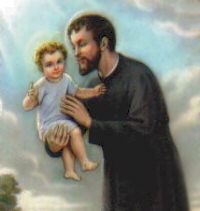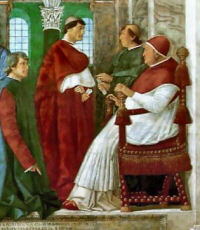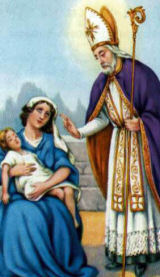Catholic Culture

Collect: By the power of the Holy Spirit, we pray, almighty God, make us docile in believing the faith and courageous in confessing it, just as you granted Saint Sixtus and his companions that they might lay down their lives for the sake of your word and in witness to Jesus. Who lives and reigns with you in the unity of the Holy Spirit, one God, for ever and ever.
O God, who endowed the Priest Saint Cajetan with the grace of imitating the apostolic way of life, grant us, through his example and intercession, to trust in you at all times and to seek unceasingly your Kingdom. Through our Lord Jesus Christ, your Son, who lives and reigns with you in the unity of the Holy Spirit, one God, for ever and ever.
o Beefs Portuguese Style
o Religion in the Home for Elementary School: August
o Religion in the Home for Preschool: August
o The Immaculate Heart
o Novena to Saint Cajetan - Patron of the Unemployed
Ordinary Time: August 7th
Optional Memorial of Sts. Sixtus II, pope and martyr and companions, martyrs and Optional Memorial of St. Cajetan, priest
Old Calendar: St. Cajetan, confessor; St. Donatus, bishop and martyr
With the future Pope Paul IV, St. Cajetan founded the first congregation of Clerks Regular, a new form of institute which corresponded with the needs of the time. Trust in God was its principal rule; its members were forbidden to ask for alms and depended entirely on the spontaneous charity of the faithful. Such was Cajetan's zeal in seeking the salvation of souls that he came to be called "the hunter of souls." He died at Naples on August 7, 1547.
Today is also the feast of Sts. Sixtus II and his companions, Felicissimus and Agapitus. Pope Sixtus II was one of the first victims of the persecution under the Emperor Valerian. Felicissimus and Agapitus were two of his deacons who were executed with him. Sixtus governed the Church from 256 to 258. His name is mentioned in the Canon of the Mass.
St. Sixture and St. Cajetan's feasts are celebrated today both in the Ordinary Form and the Extraordinary Form of the Roman Rite.
According to the 1962 Missal of Bl. John XXIII the Extraordinary Form of the Roman Rite, today is the feast of St. Donatus. His name occurs second on the list of the bishops of the See of Arezzo. Little is known of him. The Acts of his martyrdom, unfortunately, do not merit credence.
St. Sixtus II and companions

Even as the storm of persecution created by Emperor Valerian raged against the Church, the papal throne was not vacant. Sixtus, a Greek, was elected to succeed Stephen. The emperor's decrees had ordered the Christians to take part in state religious ceremonies and forbade them to assemble in cemeteries. For nearly a year Sixtus managed to evade the authorities before he was gloriously martyred.
Valerian issued his second edict ordering the execution of Christian bishops, priests, and deacons. Sixtus had taken to holding services in the private cemetery of Praetextatus because it was not watched as closely by the authorities as was the cemetery of Calixtus. But in early August of 258, while Sixtus was seated on his episcopal chair and surrounded by the brethren, the soldiers broke in arresting Sixtus and four deacons who were in attendance. After a formal judgment, Sixtus was led back to the very place where he had been arrested, to face execution. His chief deacon Lawrence, upon hearing the news, hastened to his side, desiring to die with his bishop. Sixtus consoled his deacon by telling him that he would follow in three days with even greater glory. The soldiers then placed Sixtus in his chair and swiftly beheaded him. True to the great pope's words, Lawrence was arrested three days later and executed the same day.
Excerpted from The Popes: A Papal History, J.V. Bartlett
Symbols: Cross; sword.
Often Portrayed As: Giving Saint Lawrence a bag of money to give to the poor; with Saint Lawrence; with Saint Lawrence and Saint John the Baptist.
St. Cajetan

Cajetan, a co-founder of the Theatines, received the office of protonotary at Rome from Pope Julius II when still quite young. After he was ordained priest in 1516, he left the papal court and dedicated himself entirely to the service of the Lord. With his own hands he cared for the sick. Such zeal did he show for the salvation of his fellowmen that he was surnamed the "huntsman for souls."
In order to raise the standards of ecclesiastical discipline among the clergy, Cajetan founded in 1524 a community of Clerks Regular who were to lead an apostolic life. They were to look with disdain upon all earthly belongings, to receive no income, to accept no salaries from the faithful; only from that which was freely offered were they allowed to retain the means of livelihood. Thus they were to rely unreservedly upon Divine Providence.
St. Cajetan often prayed eight hours daily. He was particularly active during the Breviary reform under Pope Clement VII. He was kind, mild, but above all, humble. He asked God that no one should know the place of his burial. While attending the Christmas celebration at St. Mary of the Crib, he is said to have been given the grace of receiving from Mary the Child Jesus into his arms. During the sack of Rome by the soldiers of Charles V in 1527, he was tortured and cast into prison because he refused to surrender certain church monies which, in fact, he had distributed among the poor. An insurrection filled him with such grief and sorrow that he took sick and died.
Excerpted from The Church's Year of Grace, Pius Parsch
Patron: job seekers; unemployed.
St. Donatus

"At Arezzo in Tuscany the death of the holy bishop Donatus. Besides other miracles, he restored, by means of his prayer, a chalice broken by pagans, according to the account of Pope St. Gregory I. He was slain under Julian the Apostate about the year 363" (Martyrology).
Legend says that he was born at Nicomedia of parents who had both been slain for Christ's sake. With the holy monk Hilarinus he fled to Arezzo in Tuscany, of which city he afterwards became Bishop. There the Prefect Quadratian, during the persecution under Julian, about 362, commanded both Hilarinus and Donatus to worship idols, and when they both refused, they were slain. Hilarinus was beaten to death with clubs. Donatus was in diverse ways savagely tortured, and then put to the sword. The Christians buried their bodies honourably close by the city.
Symbols: Dragon emerging from a well; chalice; crozier; sword.
21. Then Jesus went thence, and departed into the coasts of Tyre and Sidon.
22. And, behold, a woman of Canaan came out of the same coasts, and cried to him, saying, Have mercy on me, O Lord, you Son of David; my daughter is grievously vexed with a devil.
23. But he answered her not a word. And his disciples came and besought him, saying, Send her away, for she cries after us.
24. But he answered and said, I am not sent but to the lost sheep of the house of Israel.
25. Then came she and worshipped him, saying, Lord, help me.
26. But he answered and said, It is not meet to take the children's bread, and to cast it to dogs.
27. And she said, Truth, Lord: yet the dogs eat of the crumbs which fall from their masters' table.
28. Then Jesus answered and said to her, O woman, great is your faith: be it to you even as you will. And her daughter was made whole from that very hour.
JEROME; Leaving the Scribes and Pharisees and those cavilers, He passes into the parts of Tyre and Sidon, that He may heal the Tyrians and Sidonians; And Jesus went thence, and departed into the coasts of Tyre and Sidon.
REMIG; Tyre and Sidon were Gentile towns, for Tyre was the metropolis of the Chananaeans, and Sidon the boundary of the Chananaeans towards the north.
CHRYS; It should be observed, that when He delivered the Jews from the observance of meats, He then also opened the door to the Gentiles, as Peter was first bidden in the vision to break this law, and was afterwards sent to Cornelius. But if any should ask, how it is that He bade His disciples go not into the way of the Gentiles, and yet now Himself walks this way; we will answer, first, that that precept which He had given His disciples was not obligatory on Him; secondly, that He went not to preach, whence Mark even says, that He purposely concealed Himself.
REMIG; He went that He might heal them of Tyre and Sidon; or that He might deliver this woman's daughter from the demon, and so through her faith might condemn the wickedness of the Scribes and Pharisees. Of this woman it proceeds And, behold, a woman, a Chananite, came out from those parts.
CHRYS; The Evangelist says that she was a Chananaean, to show the power of Christ's presence. For this nation, which had been driven out that they might not corrupt the Jews, now showed themselves wiser than the Jews, leaving their own borders that they might go to Christ. And when she came to Him, she asked only for mercy, as it follows, She cried to Him, saying, Have mercy on me, Lord, you Son of David.
GLOSS; The great faith of this Chananaean woman is herein showed. She believes Him to be God, in that she calls Him Lord; and man, in that she calls Him Son of David. She claims nothing of her own desert, but craves only God's mercy. And she says not, Have mercy on my daughter, but Have mercy on me; because the affliction of the daughter is the affliction of the mother. And the more to excite His compassion, she declares to Him the whole of her grief, My daughter is grievously vexed by a demon; thus unfolding to the Physician the wound and the extent and nature of the disease; its extent, when she says is grievously vexed; its nature, by a demon.
CHRYS; Note the wisdom of this woman, in she went not to men who promised fair, she sought not useless bandages, but leaving all devilish charms, she came to the Lord. She asked not James, she did not pray John, or apply to Peter, but putting herself under the protection of penitence, she ran alone to the Lord. But, behold, a new trouble. She makes her petition, raising her voice into a shout, and God, the lover of mankind, answers not a word.
JEROME; Not from pharisaic pride, or the superciliousness of the Scribes, but that He might not seem to contravene His own decision, Go not into the way of the Gentiles. For He was unwilling to give occasion to their cavils, and reserved the complete salvation of the Gentiles for the season of His passion and resurrection.
GLOSS; And by this delay in answering, He shows us the patience and perseverance of this woman. And He answered not for this reason also, that the disciples might petition for her; showing herein that the prayers of the Saints are necessary in order to obtain any thing; as it follows, And his disciples came to him, saying, Send her away, for she cries after us.
JEROME; The disciples, as yet ignorant of the mysteries of God or moved by compassion, beg for this Chananean woman; or perhaps seeking to be rid of her importunity.
AUG; A question of discrepancy is raised upon this, that Mark says the Lord was in the house when the woman came praying for her daughter. Indeed Matthew might; have been understood to have omitted mention of the house and yet to have been relating the same event; but when he says, that the disciples suggested to the Lord, Send her away, for she cries after us, he seems to indicate clearly that the woman raised her voice in supplication, in following the Lord who was walking. We must understand then, that as Mark writes, she entered in where Jesus was, that is, as he had noticed above, in the house; then, that as Matthew writes, He answered her not a word, and during this silence of both sides, Jesus left the house; and then the rest follows without any discordance.
CHRYS; I judge that the disciples were sorry for the woman's affliction, yet dared not say, Grant her this mercy, but only Send her away as we, when we would persuade any one, oftentimes say the very contrary to what we wish. He answered and said, I am not sent but to the lost sheep of the house of Israel.
JEROME; He says that He is not sent to the Gentiles but that He is sent first to Israel, so that when they would not receive the Gospel, the passing over to the Gentiles might have just cause.
REMIG; In this way also He was sent specially to the Jews, because He taught them by His bodily presence.
JEROME; And He adds of the house of Israel, with this design, that we might rightly interpret by this place that other parable concerning the stray sheep.
CHRYS; But when the woman saw that the Apostles had no power, she became bold with commendable boldness; for before she had not dared to come before His sight but, as it is said, She cries after us. But when it seemed that she must now retire without being relieved, she came nearer, But she came and worshipped him.
JEROME; Note how perseveringly this Chananaean woman calls Him first Son of David, then Lord, and lastly came and worshipped him, as God.
CHRYS; And therefore she said not Ask, or Pray God for me, but Lord, help me. But the more the woman urged her petition, the more He strengthened His denial; for He calls the Jews now not sheep but sons, and the Gentiles dogs; He answered and said to her, It is not meet to take the children's bread, and give it to dogs.
GLOSS; The Jews were born sons, and brought up by the Law in the worship of one God. The bread is the Gospel, its miracles and other things which pertain to our salvation. It is not then meet that these should be taken from the children and given to the Gentiles, who are dogs, till the Jews refuse them.
JEROME; The Gentiles are called dogs because of their idolatry; who, given to the eating of blood, and dead bodies, turn to madness.
CHRYS; Observe this woman's prudence; she does not dare to contradict Him, nor is she vexed with the commendation of the Jews, and the evil word applied to herself; But she said, Yea, Lord, yet the dogs eat of the crumbs which fall from their masters' table. He said, It is not good; she answers, 'Yet even so, Lord;' He calls the Jews children, she calls them masters; He called her a dog, she accepts the office of a dog; as if she had said, I cannot leave the table of my Lord.
JEROME; Wonderful are shown the faith, patience, and humility of this woman; faith, that she believed that her daughter could be healed; patience, that so many times overlooked, she yet perseveres in her prayers; humility, that she compares herself not to the dogs, but to the whelps. I know, she says, that I do not deserve the children's bread, and that I cannot have whole meat, nor sit at the table with the master of the house, but I am content with that which is left for the whelps, that through humble fragments I may come to the amplitude of the perfect bread.
CHRYS; This was the cause why Christ was so backward, that He knew what she would say, and would not have her so great excellence hid; whence it follows, Then Jesus answered and said to her, O woman, great is your faith, be it to you according to your will. Observe how the woman herself had contributed not a little to her daughter's healing; and therefore Christ said not to her, 'Let your daughter be healed', but, Be it to you according to your will; that you may perceive that she had spoken in sincerity, and that her words were not words of flattery, but of abundant faith. And this word of Christ is like that word which said, Let there be a firmament and it was made; so here, And her daughter was made whole from that hour. Observe how she obtains what the Apostles could not obtain for her; so great a thing is the earnestness of prayer. He would rather that we should pray for our own offenses ourselves, than that others should pray for us.
REMIG; In these words is given us a pattern of catechizing and baptizing children; for the woman says not 'Heal my daughter,' or 'Help her,' but, Have mercy upon me, and help me. Thus there has come down in the Church the practice that the faithful are sponsors to God for their young children, before they have attained such age and reason that they can themselves make any pledge to God. So that as by this woman's faith her daughter was healed, so by the faith of Catholics of mature age their sins might be forgiven to infants. Allegorically; This woman figures the Holy Church gathered out of the Gentiles. The Lord leaves the Scribes and Pharisees, and comes into the parts of Tyre and Sidon; this figures His leaving the Jews and going over to the Gentiles. This woman came out of her own country, because the Holy Church departed from former errors and sins.
JEROME; And the daughter of this Chananean I suppose to be the souls of believers who were sorely vexed by a demon, not knowing their Creator, and bowing down to stones.
REMIG; Those of whom the Lord speaks as children are the Patriarchs and Prophets of that time. By the table is signified the Holy Scripture, by the fragments the best precepts, or inward mysteries on which Holy Church feeds; by the crumbs the carnal precepts which the Jews keep. The fragments are said to be eaten under the table, because the Church submits itself humbly to fulfilling the Divine commands.
RABAN; But the whelps eat not the crust only, but the crumbs of the children's bread, because the despised among the Gentiles on turning to the faith, seek out in Scripture not the outside of the letter, but the spiritual sense, by which they may be able to profit in good acts.
JEROME; Wonderful change of things! Once Israel the son, and we the dogs; the change in faith has led to a change in the order of our names. Concerning them is said, Many dogs have come about me; while to us is said, as to this woman, your faith has made you whole.
RABAN; Great indeed was her faith; for the Gentiles, neither trained in the Law, nor educated by the words of the Prophets, straightway on the preaching of the Apostles obeyed with the hearing of the ear, and therefore deserved to obtain salvation.
GLOSS; And if the Lord delays the salvation of a soul at the first tears of the supplicating Church, we ought not to despair, or to cease from our prayers, but rather continue them earnestly.
AUG; And that to heal the Centurion's servant, and the daughter of this Chananean woman, He does not go to their houses, signifies that the Gentiles, among whom He Himself went not, should be saved by His word. That these are healed on the prayer of their parents, we must understand of the Church, which is at once mother and children; the whole body of those who make up the Church is the mother, and each individual of that body is a son of that mother.
HILARY; Or, This mother represents the proselytes, in that she leaves her own country, and forsakes the Gentiles for the name of another nation; she prays for her daughter, that is, the body of the Gentiles possessed with unclean spirits; and having learned the Lord by the Law, calls Him the Son of David.
RABAN; Also whosoever has his conscience polluted with the defilement of any sin, has a daughter sorely vexed by a demon. Also whosoever has defiled any good that he has done by the plague of sin, has a daughter tossed by the furies of an unclean spirit, and has need to fly to prayers and tears, and to seek the intercessions and aids of the saints.
Catena Aurea Matthew 15





